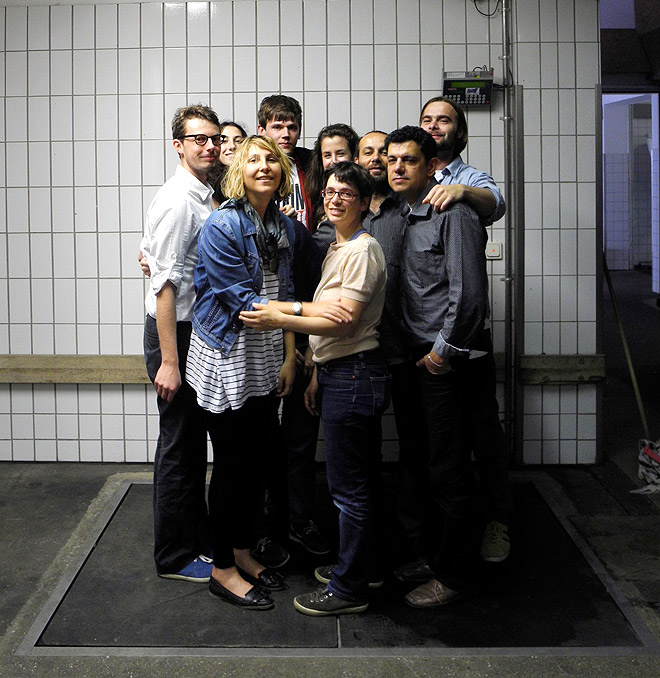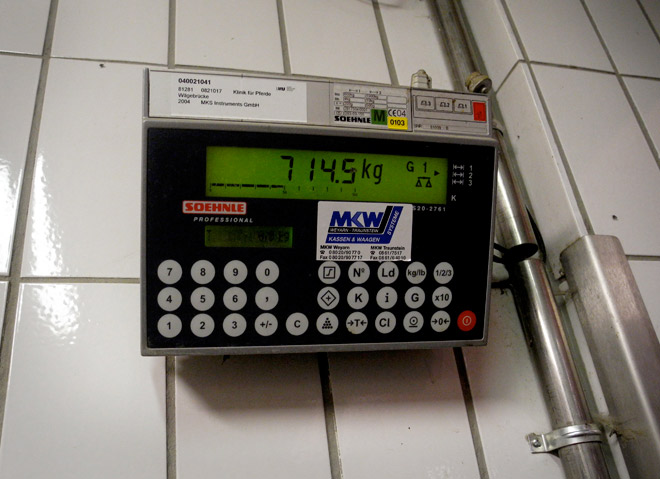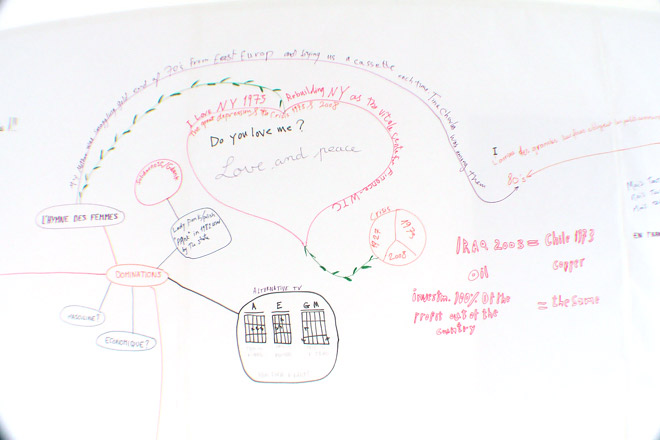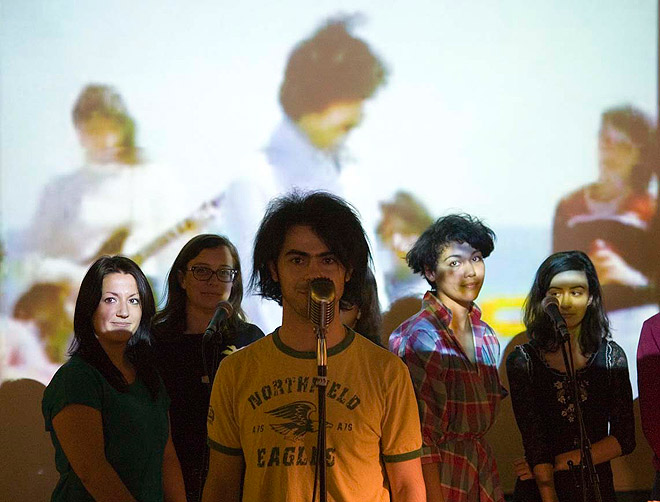Chicago Boys: While we were singing, they were dreaming
The idea of the Chicago Boys as the 1970s Middle-East pop-music revival band and neoliberal study group developed over a period of months while I was researching YouTube for documentaries about the Iraq war and its connection to neoliberalism, and during the same period listening to the music of my childhood. The simultaneity created a kind of environmental connectivity that is closely related not by the topic but by the concurrence of the events.
All these elements were important when trying to trace back the reasons for Second Gulf War and the recent harsh effects of the rapid implementation of both democracy and neoliberal economy in Iraq. I found the lectures on the history of neoliberal economy by David Harvey, and The Shock Doctrine by Naomi Klein to be crucial resources. This started me on the path to look at previous models. The most significant being the forms of implementation of neoliberal reform after the coup in Chile under the dictator Augusto Pinochet in 1973 and the situation in Iraq under the appointed US administrator Paul Bremer who had vast power after 2003. The successful transformation of economies through political turmoil was clearly connected to confusion caused by the war, dictatorship, and revolution.

The first edition of Chicago Boys occurred April 2010 in London as a part of The Edgware Road Project - The Centre for Possible Studies, the artist-in-residency programme of the Serpentine Gallery. I was looking for the project participants who, like myself, come from the Middle East and could possibly contribute to the project with their personal stories. The idea was to collectively begin tracing the global economic and political changes, especially connected to our region in the 1970s. The important ongoing changes of the period include: the US control over the means of banking national incomes from petrol, the so called petrodollar warfare; revolutions; dictatorship; and the growing span of pop-culture including music and TV. The world of 1970s was pregnant with the next generation of leaders who, like Reagan and Thatcher, in the following decade would became the major promoters of a neoliberal ideology. The next decades also brought the weakening or complete disappearance of the left in the Middle East which, in part, allowed the neoliberal order to spread without an ideological counterpoint.
The title, Chicago Boys, originates from the nickname of a group of young Chilean economist who studied in at the school of Economics at the University of Chicago under Milton Friedman long before neoliberalism was introduced as a new global order. After their studies they returned to Chile under the dictatorship condition and started to implement the radical free market economic concepts Friedman theorized. General Pinochet provided the first nest for Friedman’s economic theories to grow and the possibility for the severe changes to be put into practice.

I have always been interested in the informal and autodidactic forms of learning. In my youth in Iraqi Kurdistan I was involved with peer-to-peer educational circles. The acoustic space and playing music has also always been a natural part of my environment. Perhaps the origins of the musical and educational exchanges in Chicago Boys can be traced back to these early moment. Music is a medium that makes possible the creation of an immediate and long-term informal set of relations. One of the intentions of the project has been to share what we know and what we wish to know in a way the musical exercises can be shared.
The composition of the 'band' in Chicago Boys is not defined - there are participants and contributors, but no members. No special music skills are required for the participants. Peer to peer forms are utilized, such teaching songs by ear and making visible the notes on instruments with post-its so anyone can play. Also playing collaboratively is encouraged for example with four amateur hands on one keyboard. Mainly contributors are young artists, students, writers and social researchers, most of whom are not train musicians. No expert knowledge is necessary. The contributors deal with the subject of study on more a more anecdotal and interpersonal level. We practice together, sing together, learn to play different instruments through visual means of notation, share anecdotes and experiences relating to situation that changed the lives of their families in 1970 and 80s. We dig into our family archives, YouTube channels and other resources to tell the stories, interpretations and conclusions that through their individuation and specificity add another colour to the panorama of relations between today’s neoliberal order and its roots in the preceding changes of 1970s. The state interventionism most of us grew up is questioned and the conflicting economic concepts and political views are presented. The selected songs were collectively chosen, originating from different regions Kurdistan, Iraq, Iran, Afghanistan and Lebanon. The songs are significant, not necessarily for their lyrics, but rather the context and the personal histories surrounding them. This also describes the way in which the politics is articulated in the project, approaching it as an association of subjective elements and parallel stories.

A Chicago Boys performance has the form of the concert, combining singing and playing instruments together with the presentations of anecdotes and videos that interweave the personal and political related to each song. At times this entanglement can also occur in the music. For example in Munich we played the entrancing ‘Talagh’ by the Iranian diva Googoosh from the early 70s. The song appeared in Iraq during the Iran-Iraq war when Saddam Hussein allowed the Iranian resistance movement, the People's Mujahideen of Iran, to set up a Farsi-language TV channel in Iraq to broadcast propaganda. The channel also included Iranian pop music that had since been banned after the Iranian revolution. The song itself is a blend of traditional types of persian vocals with a driving electric guitar riff sampled from a track in the rock opera, “Jesus Christ Superstar” by Andrew Lloyd Webber. When we played the song at the Kunstverein it was altered to include another rhythm called the chobi chobi, a traditional drum beat from the south of Iraq that was appropriated by Ba’ath Party propaganda during Iraq-Iran war to support Saddam Hussein. These musical concurrences from different geographies and ideological affiliations can come together into a single song, and with this harmonial juxtaposition open up a new critical acoustic space.

This form of approach is necessary when working in a large geographic, political and multi-disciplinary community - where different knowledges, competencies and skills come together. The project relates to functioning in another culture what is linked to political, cultural and economic immigration. It is then touching upon living in different and sometimes multiple cultural formations. It confronts individualism and collectivism. The complications in the project come up in relation to the Western concept of individual liberation. An example is seen in the movie White Nights [Taylor Hackford, 1985], which was broadcasted on Iraqi TV during the Iran-Iraq war and after Donald Rumsfeld’s visit to Iraq 1983. The film depicts Mikhail Baryshnikov playing a dancer who escaped the Soviet Union – a position similar to his own biography as a refugee. In one scene, he dances alone on stage in a grand theatre without an audience, the movements defy the conventions of his training and find freedom to merge his own emotional state with the form. This is contrasted by cut-away shots of his former fiancee going through the rigorous classical ballet drills in distant Moscow. In Chicago Boys, different forms of continual opposition of elements and ideas that can be seen as the foundation of both music and politics. A difference that provokes an engagement in the process and demands that listening is not enough. The project since then has developed in relation to the sites of Alternativa (Wyspa, Gdansk, Poland), and was hosted by Casco - Office for Art, Design and Theory and if I Can't Dance, I Don't Want to Be Part of Your Revolution (Holland) for a preiod of two months in the frame work of the Dutch Tour and The Arts Against Cuts Direct Weekend (London) among others.

The repertoire of songs and stories also changes and expands to include contributions from local inhabitants and histories wherever the project is hosted. So far, Chicago Boys travelled to Gdansk in the context of Alternativa at Wyspa. Then it had an extensive "tour" in the Netherlands, appropriating a well known romantic form of band touring, developed by Casco - Office for Art, Design and Theory and if I Can't Dance, I Don't Want to Be Part of Your Revolution for a period of two months. Besides, it also performed at Nottingham Contemporary and the Arts Against Cuts Direct Weekend (London) among others and recently had a "class" in the summer school 'Group Affinity' at Kunstverein Munich. Each location encourages new people to contribute to the project with new economic and political geographies, private stories and musical contribution as the main goal of Chicago Boys is to study the issues of the project’s concern in an informal and collective way and distribute it in a form of music event with the number of oral contributions, archival examples and personal stories.